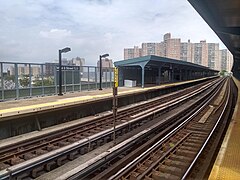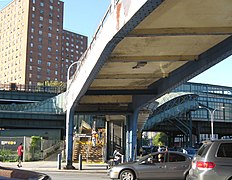West Eighth Street–New York Aquarium station
West 8 Street–New York Aquarium B36, B68 | |||||||||||||||||||||||||||||||||||||||||||||||||||||||||||||||||||||||||||||||||||||||||||||||||||||||||||||||||||||||||||||||||||||||||||||||||||||||||||||||||||||||||||||||||||||||||||||||||||||||
|---|---|---|---|---|---|---|---|---|---|---|---|---|---|---|---|---|---|---|---|---|---|---|---|---|---|---|---|---|---|---|---|---|---|---|---|---|---|---|---|---|---|---|---|---|---|---|---|---|---|---|---|---|---|---|---|---|---|---|---|---|---|---|---|---|---|---|---|---|---|---|---|---|---|---|---|---|---|---|---|---|---|---|---|---|---|---|---|---|---|---|---|---|---|---|---|---|---|---|---|---|---|---|---|---|---|---|---|---|---|---|---|---|---|---|---|---|---|---|---|---|---|---|---|---|---|---|---|---|---|---|---|---|---|---|---|---|---|---|---|---|---|---|---|---|---|---|---|---|---|---|---|---|---|---|---|---|---|---|---|---|---|---|---|---|---|---|---|---|---|---|---|---|---|---|---|---|---|---|---|---|---|---|---|---|---|---|---|---|---|---|---|---|---|---|---|---|---|---|---|
| Structure | Elevated | ||||||||||||||||||||||||||||||||||||||||||||||||||||||||||||||||||||||||||||||||||||||||||||||||||||||||||||||||||||||||||||||||||||||||||||||||||||||||||||||||||||||||||||||||||||||||||||||||||||||
| Levels | 2 | ||||||||||||||||||||||||||||||||||||||||||||||||||||||||||||||||||||||||||||||||||||||||||||||||||||||||||||||||||||||||||||||||||||||||||||||||||||||||||||||||||||||||||||||||||||||||||||||||||||||
| Platforms | 4 side platforms (2 on each level) | ||||||||||||||||||||||||||||||||||||||||||||||||||||||||||||||||||||||||||||||||||||||||||||||||||||||||||||||||||||||||||||||||||||||||||||||||||||||||||||||||||||||||||||||||||||||||||||||||||||||
| Tracks | 4 (2 on each level) | ||||||||||||||||||||||||||||||||||||||||||||||||||||||||||||||||||||||||||||||||||||||||||||||||||||||||||||||||||||||||||||||||||||||||||||||||||||||||||||||||||||||||||||||||||||||||||||||||||||||
| Other information | |||||||||||||||||||||||||||||||||||||||||||||||||||||||||||||||||||||||||||||||||||||||||||||||||||||||||||||||||||||||||||||||||||||||||||||||||||||||||||||||||||||||||||||||||||||||||||||||||||||||
| Opened | May 19, 1919 | ||||||||||||||||||||||||||||||||||||||||||||||||||||||||||||||||||||||||||||||||||||||||||||||||||||||||||||||||||||||||||||||||||||||||||||||||||||||||||||||||||||||||||||||||||||||||||||||||||||||
| Opposite- direction transfer | Yes | ||||||||||||||||||||||||||||||||||||||||||||||||||||||||||||||||||||||||||||||||||||||||||||||||||||||||||||||||||||||||||||||||||||||||||||||||||||||||||||||||||||||||||||||||||||||||||||||||||||||
| Former/other names | Coney Island–West Eighth Street | ||||||||||||||||||||||||||||||||||||||||||||||||||||||||||||||||||||||||||||||||||||||||||||||||||||||||||||||||||||||||||||||||||||||||||||||||||||||||||||||||||||||||||||||||||||||||||||||||||||||
| Traffic | |||||||||||||||||||||||||||||||||||||||||||||||||||||||||||||||||||||||||||||||||||||||||||||||||||||||||||||||||||||||||||||||||||||||||||||||||||||||||||||||||||||||||||||||||||||||||||||||||||||||
| 2023 | 640,138[2] | ||||||||||||||||||||||||||||||||||||||||||||||||||||||||||||||||||||||||||||||||||||||||||||||||||||||||||||||||||||||||||||||||||||||||||||||||||||||||||||||||||||||||||||||||||||||||||||||||||||||
| Rank | 355 out of 423[2] | ||||||||||||||||||||||||||||||||||||||||||||||||||||||||||||||||||||||||||||||||||||||||||||||||||||||||||||||||||||||||||||||||||||||||||||||||||||||||||||||||||||||||||||||||||||||||||||||||||||||
| |||||||||||||||||||||||||||||||||||||||||||||||||||||||||||||||||||||||||||||||||||||||||||||||||||||||||||||||||||||||||||||||||||||||||||||||||||||||||||||||||||||||||||||||||||||||||||||||||||||||
| |||||||||||||||||||||||||||||||||||||||||||||||||||||||||||||||||||||||||||||||||||||||||||||||||||||||||||||||||||||||||||||||||||||||||||||||||||||||||||||||||||||||||||||||||||||||||||||||||||||||
| |||||||||||||||||||||||||||||||||||||||||||||||||||||||||||||||||||||||||||||||||||||||||||||||||||||||||||||||||||||||||||||||||||||||||||||||||||||||||||||||||||||||||||||||||||||||||||||||||||||||
| |||||||||||||||||||||||||||||||||||||||||||||||||||||||||||||||||||||||||||||||||||||||||||||||||||||||||||||||||||||||||||||||||||||||||||||||||||||||||||||||||||||||||||||||||||||||||||||||||||||||
| |||||||||||||||||||||||||||||||||||||||||||||||||||||||||||||||||||||||||||||||||||||||||||||||||||||||||||||||||||||||||||||||||||||||||||||||||||||||||||||||||||||||||||||||||||||||||||||||||||||||
The West Eighth Street–New York Aquarium station is a
History

The station, originally identified as Coney Island–West Eighth Street, replaced the Culver Depot, the surface terminus of the Brighton Beach and Culver Lines. The new station consisted of a two-level elevated line, with two tracks and two side platforms on each level. Brighton service began serving the station on June 13, 1919,[3] with Brighton Local trains using the lower level and Brighton Express trains (when operated) using the upper level. On May 1, 1920, Culver trains began sharing the lower level with the Brighton Line.
The usage of both levels varied over the years, with different Brighton services using the lower level at different times. Brighton Locals used the lower level of West 8th Street until 1954,[3] when the track connection between the Brighton Line at Ocean Parkway and the lower level of West 8th Street station was severed. Brighton and Culver trains have had exclusive use of their respective levels ever since. The structure for the connector tracks still exists.
In September 1954, the NYCTA announced that it would build a 700 feet (210 m)-long overpass connecting the station with the then proposed New York Aquarium. The estimated cost for the project was $500,000, and it was expected to be completed by November 1955.[4]
In 2002, it was announced that West Eighth Street would be one of ten subway stations citywide to receive renovations.[5] The station was closed in August 2002 in conjunction with the reconstruction of the Coney Island–Stillwell Avenue terminal,[6] and service was restored on May 23, 2004.[7] The renovation took place during the temporary closure.
The pedestrian bridge was torn down on August 8, 2013, due to safety issues. A crosswalk and widened sidewalks replaced the bridge, which was built when the New York Aquarium was first opened at that location.[8] In 2024, the MTA announced that it would install low platform fences at the West Eighth Street–New York Aquarium station at the Clark Street station to reduce the likelihood of passengers falling onto the tracks.[9][10] The barriers would consist of low yellow fences, spaced along the length of the platform; there would not be sliding platform screen doors between the barriers.[9]
Station layout
| 3F Brighton platforms |
Side platform | |
| Southbound | ← | |
| Northbound | | |
| Side platform | ||
| 2F Culver platforms |
Side platform | |
| Southbound | ← | |
| Northbound | | |
| Side platform | ||
| G | Street level | Exit/entrance, fare control |
The current station continues to have two tracks and two side platforms on each level; the BMT Brighton Line currently uses the upper level and the IND Culver Line uses the lower level.
The 2005 artwork here is called Wavewall by Vito Acconci.[11]
Exits
This station contains two entrances. The first one is located on West Eighth Street, on the west end of the station. It has a full-time station agent booth and a ramp to the mezzanine, where there are turnstiles and stairs to the platforms. There are also two stairs that lead from the mezzanine down to the west side of West Eighth Street.[12]
The second one leads to the intersection of West Fifth Street and Brighton Avenue, past the east end of the station. It contains three
Gallery
-
Abandoned trackways from lower level of station to the BMT Brighton Line
-
Entrance from West 8th Street
-
Zoom on the staircase by Vito Acconci
-
The Brighton Line platforms on the upper level
-
The Culver Line platforms on the lower level
-
Street stair and pedestrian overpass to Aquarium, demolished in August 2013
References
- ^ "Glossary". Second Avenue Subway Supplemental Draft Environmental Impact Statement (SDEIS) (PDF). Vol. 1. Metropolitan Transportation Authority. March 4, 2003. pp. 1–2. Archived from the original (PDF) on February 26, 2021. Retrieved January 1, 2021.
- ^ a b "Annual Subway Ridership (2018–2023)". Metropolitan Transportation Authority. 2023. Retrieved April 20, 2024.
- ^ a b "www.nycsubway.org: BMT Brighton Line". Retrieved August 15, 2016.
- ^ "Proposed B. M. T. Overpass to Coney Island Aquarium" (PDF). The New York Times. Retrieved October 10, 2016.
- ^ "RENOVATION IS SET FOR 10 SUBWAY STATIONS". NY Daily News. June 11, 2002. Retrieved January 8, 2018.
- ISSN 0362-4331. Retrieved March 14, 2020.
- ISSN 0362-4331. Retrieved March 14, 2020.
- ^ "Bridge abridged! Aquarium span scrapped". August 9, 2013. Retrieved August 15, 2016.
- ^ a b Roberts-Grmela, Julian; Seiwell, Emma (January 21, 2024). "MTA testing subway platform barriers in Manhattan, Brooklyn aimed at preventing track falls". New York Daily News. Retrieved January 21, 2024.
- ^ Heyward, Giulia (January 21, 2024). "MTA installs new platform barriers at 191st Street station". Gothamist. Retrieved January 21, 2024.
"New yellow safety barriers appear at subway station in Washington Heights". NBC New York. January 21, 2024. Retrieved January 21, 2024. - ^ "MTA - Arts & Design | NYCT Permanent Art". web.mta.info. Retrieved August 15, 2016.
- ^ a b "MTA Neighborhood Maps: Coney Island" (PDF). mta.info. Metropolitan Transportation Authority. 2015. Retrieved August 15, 2016.
External links
- nycsubway.org – Station: West 8th Street (Brighton/Culver Line)
- The Subway Nut - West Eighth Street Pictures
- MTA's Arts For Transit — West 8th Street–New York Aquarium
- West Eighth Street entrance from Google Maps Street View
- Surf Avenue entrance from Google Maps Street View
- Upper level from Google Maps Street View













